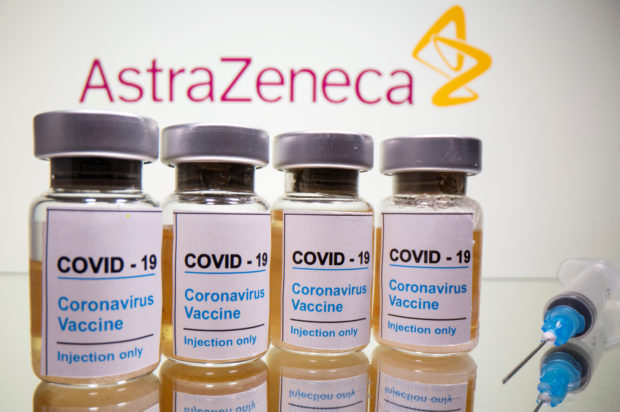
FILE PHOTO: Vials with a sticker reading, “COVID-19 / Coronavirus vaccine / Injection only” and a medical syringe are seen in front of a displayed AstraZeneca logo in this illustration taken October 31, 2020. REUTERS/Dado Ruvic/Illustration/File Photo
SANTIAGO — Chilean investigators testing the AstraZeneca-Oxford University COVID-19 vaccination in 2,200 people found no instances of blood clots among participants, they said on Friday.
Dr. Maria Elena Santolaya, from the University of Chile which led the trial, said the study included people of all ages, with 20% of them over 60 years old.
“In no age group, among women or men, did we have any blood clotting of any nature,” she said.
More than a dozen European countries suspended or restricted use of AstraZeneca’s COVID-19 vaccine, called Vaxzevria, amid reports of blood clots combined with low platelets in a very small number of people who received it.
On Friday, Chile took delivery of the first 158,400 of a promised 800,000 doses delivered through the COVAX vaccines alliance.
A further 4 million Vaxzevria doses purchased through a bilateral deal are due to start arriving in May.
Vaxzevria was approved for emergency use in Chile in January for men over 18 and women over 55 but will be used only for men since most women over 55 in Chile have already been vaccinated, the health minister said.
Ennio Vivaldi, the rector of the University of Chile, said Chileans should receive the AstraZeneca vaccine with confidence.
“All the trials show that the risks are minimal compared to the protection factor a vaccine carries,” he said.
Santolaya cited interim results of AstraZeneca’s vaccine trials among 34,000 people in Peru, Chile and the United States that showed it was 76% effective against symptomatic COVID-19, 100% effective against serious or critical COVID-19 and 85% effective against symptomatic COVID-19 among people over 65.
She said that data – gathered in a controlled trial – should not be directly compared to a real-world study that showed the Sinovac vaccine widely administered in Chile was 67% effective in preventing symptomatic infection.
“The central message behind all this is that the vaccines we have in Chile for COVID-19, Sinovac, Pfizer and now AstraZeneca, protect in more than 80% of cases against serious illness,” she said.